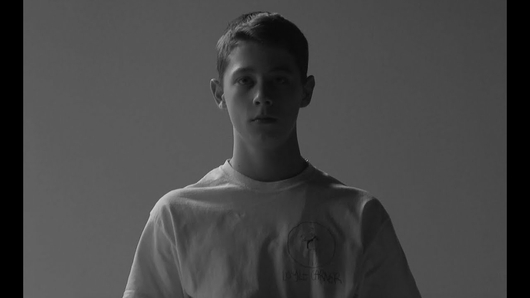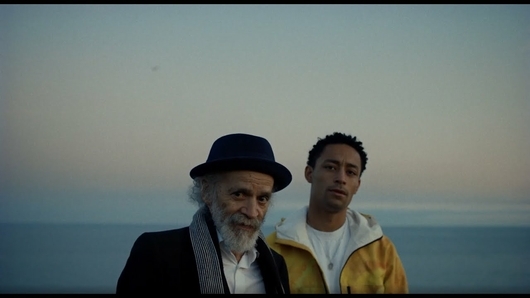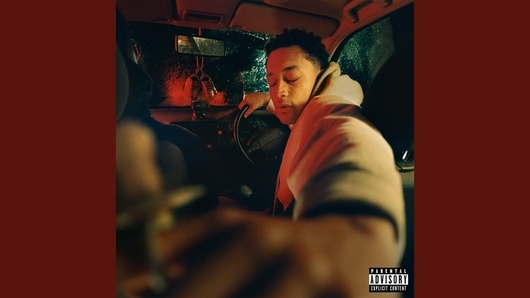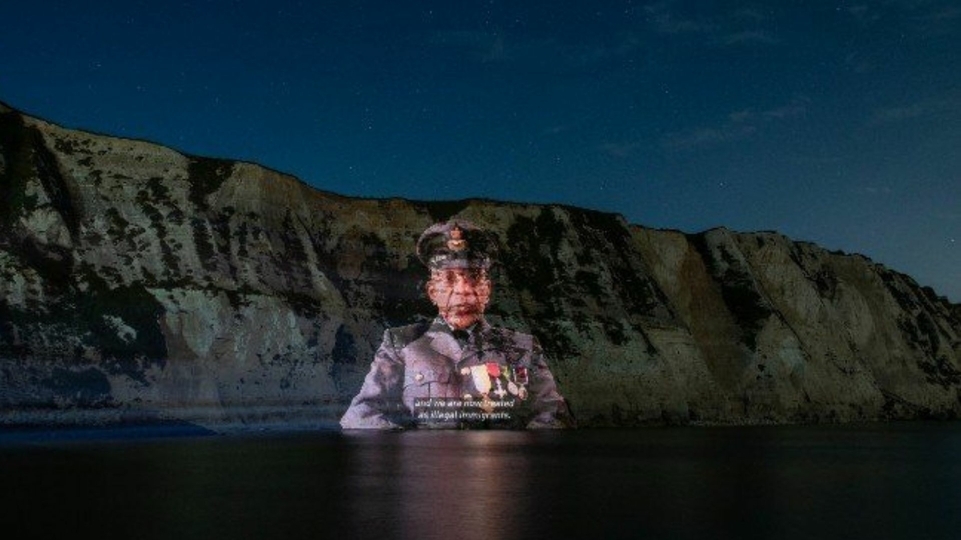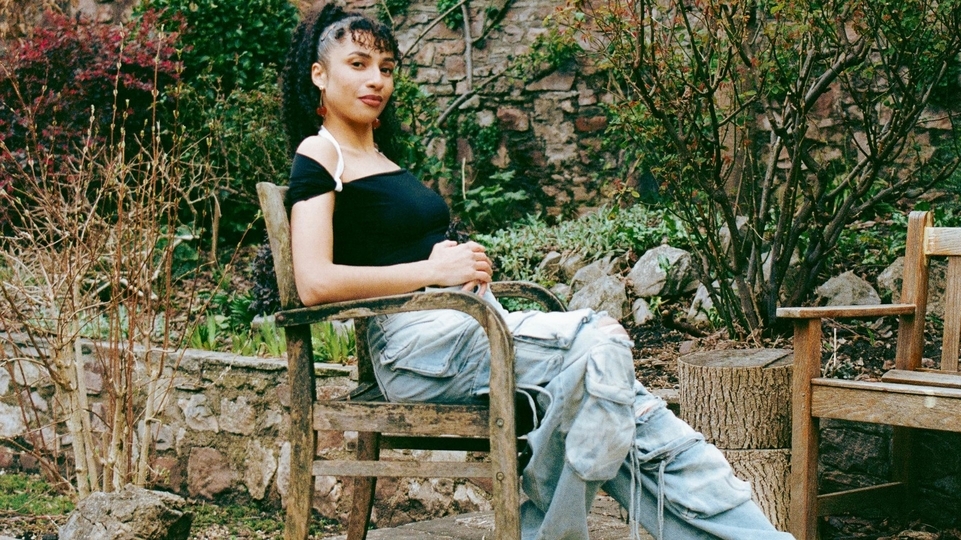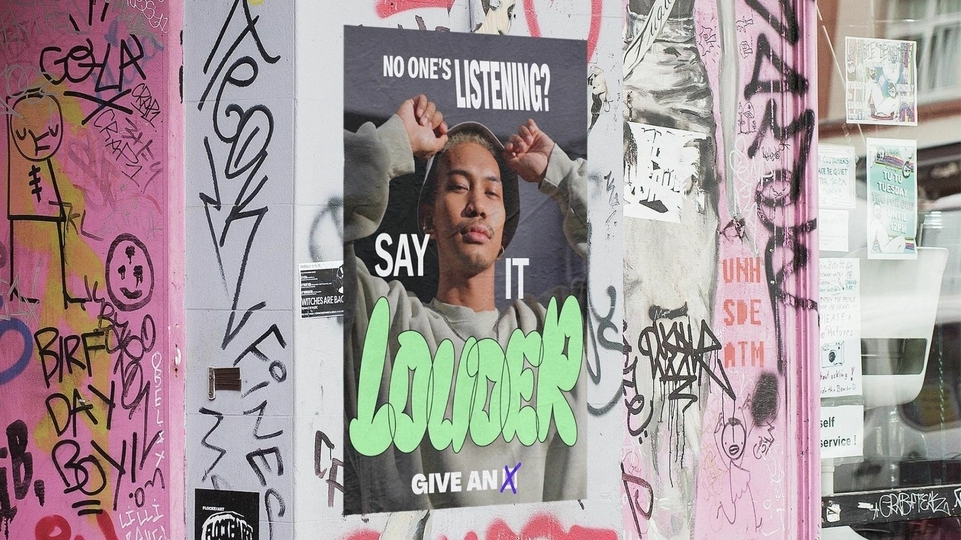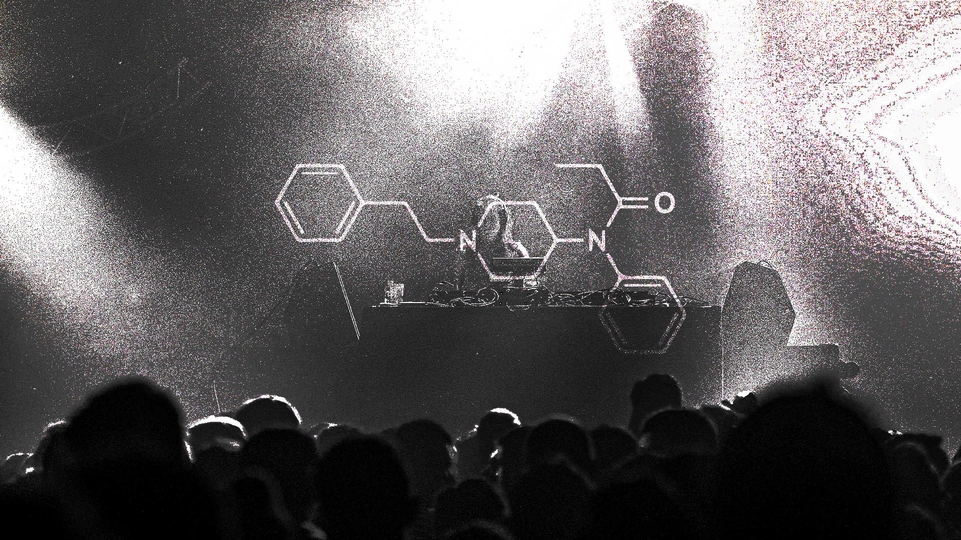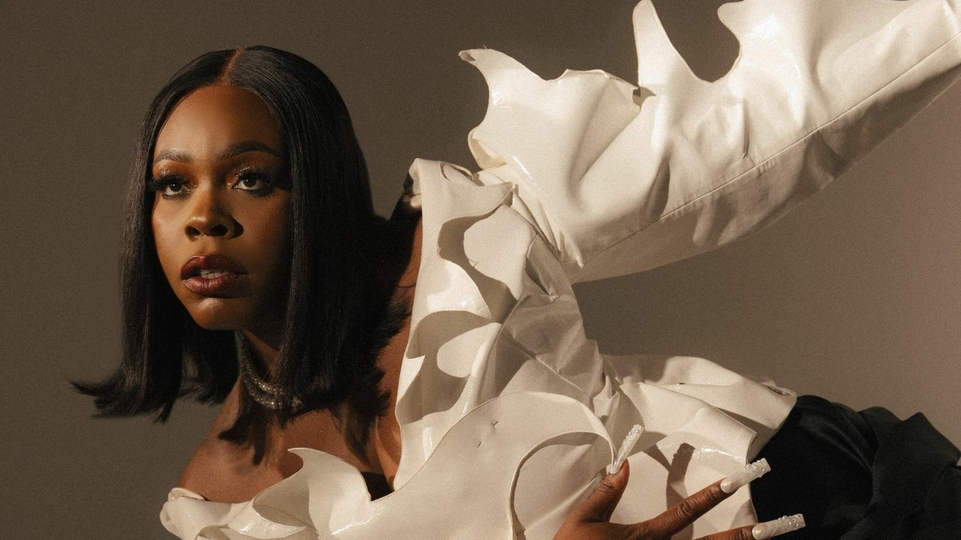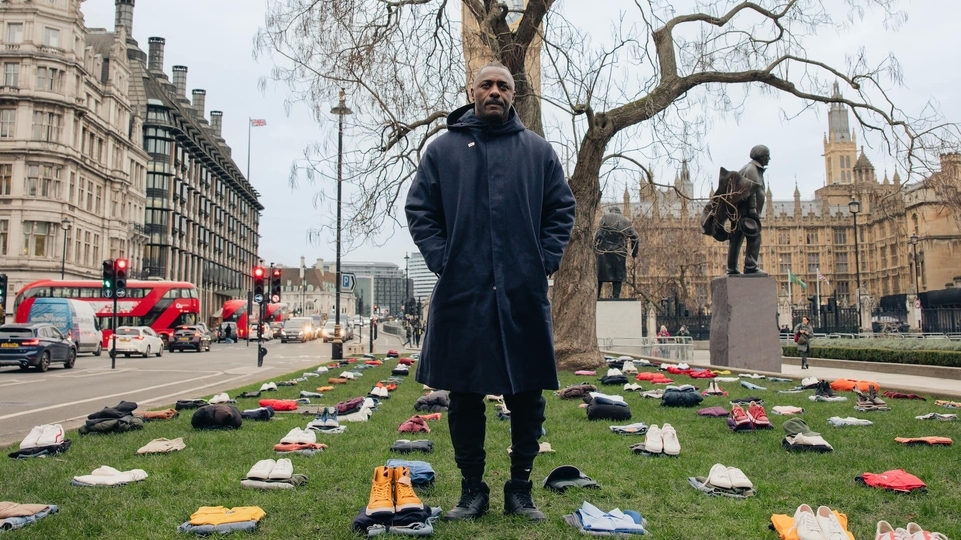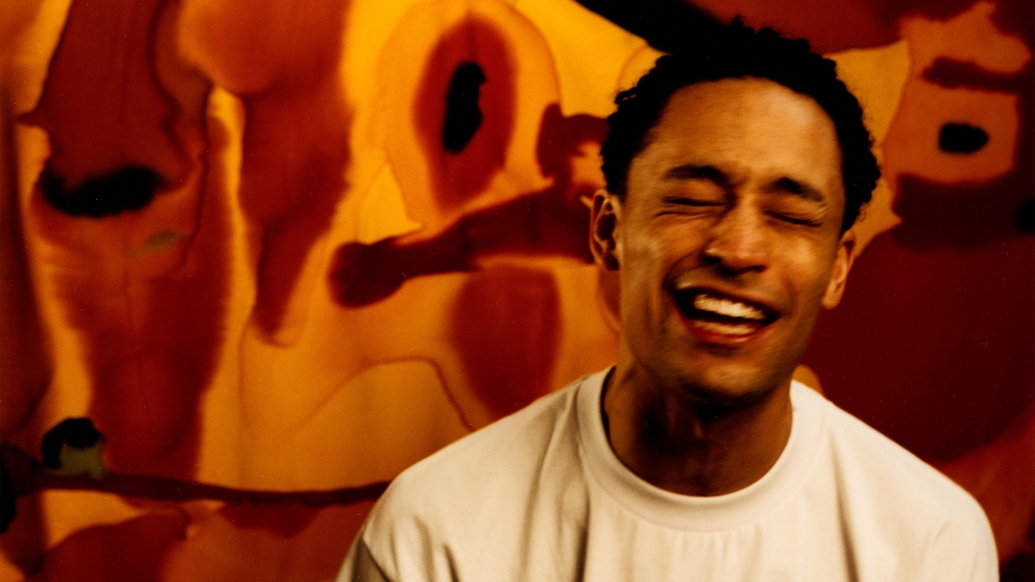
Loyle Carner: family values
Though never afraid to show vulnerability before, Loyle Carner opens himself up more than ever on new album ‘hugo’, shedding the image of UK hip-hop’s perfect ‘nice guy’ to explore his reconnection with his estranged father and his Black heritage, and what it means to become a dad himself
In the summer of 2014, as resurgent grime anthems like ‘German Whip’, ‘Take Time’ and ‘That’s Not Me’ soundtracked a new generation’s joyful block parties and rattled car chassis across the nation, 19-year-old Ben Coyle-Larner was breaking through in his own lane. The South Londoner’s earnest, endearing, boom-bap-inspired UK hip-hop situated itself in the mellower, reflective pews of Black British music’s ever-broadening church. Ben, still reeling from the sudden death of his stepdad seven months earlier, self-released his debut EP as Loyle Carner, ‘A Little Late’, in September of that year. The six-track project introduced Loyle’s unhurried flow over close friend and collaborator Rebel Kleff’s soulful, jazzy productions and is bookended by a pair of strikingly honest, intimate meditations on grief. “Of course I’m fucking sad, I miss my fucking dad,” he raps on opener ‘BFG’, voice cracking beneath the weight of his loss.
Vulnerability was nothing new in UK hip-hop, with artists from Jehst and Roots Manuva to the grittier Klashnekoff and Skinnyman often willing to wear their pain on their sleeves. But Loyle’s deeply personal vignettes felt fresh to more casual listeners, and mainstream success soon followed. His critically acclaimed debut album, the melancholy ‘Yesterday’s Gone’, was shortlisted for the Mercury Prize in 2017. Sophomore release ‘Not Waving, but Drowning’ was less lauded by critics, but still a huge commercial success, peaking at No.3 on the UK Albums Chart in 2019. Outside of music, he’s modelled for Burberry, advocated for men's mental health charity CALM, and helped launch a summer cooking school for teenagers with ADHD, a diagnosis he’s lived with since childhood.
The weekend before he speaks to DJ Mag, he guests on the BBC’s Saturday Kitchen, discussing neurodiversity with the panel while preparing baked chicken wings. Arguably, this kind of exposure plays into the reductive idea that he is UK hip-hop’s ‘nice guy’; an unproblematic fave, who’s music can be enjoyed by everyone, from enthusiasts of soulful backpack rap to the faux-liberals who’d like to ban drill. His third album, ‘hugo’, is just as diaristic and family-centred as his last two outings, but this time Loyle disassembles the ‘nice guy’ label, explores the roots of his identity, and creates important room for nuance. It represents a departure, and he’s nervous about its release. “I don’t know if I really like this bit, the waiting. I’m proud of it, but I just want it out,” he tells DJ Mag over Zoom, a couple of days after his 28th birthday, floating somewhere between serenity and tiredness after a morning spent rehearsing for an upcoming show.
“I might’ve felt annoyed about the ‘nice guy’ label in the past,” he continues. “Like, what was I gonna have to do to show people I’m human? How limiting is this Western ideal of rap music, or of being a Black man, that people will go ‘Yeah, that’s the problem with him. He’s too nice. He’s too caring’? Surely, that’s what we want from society, right?”
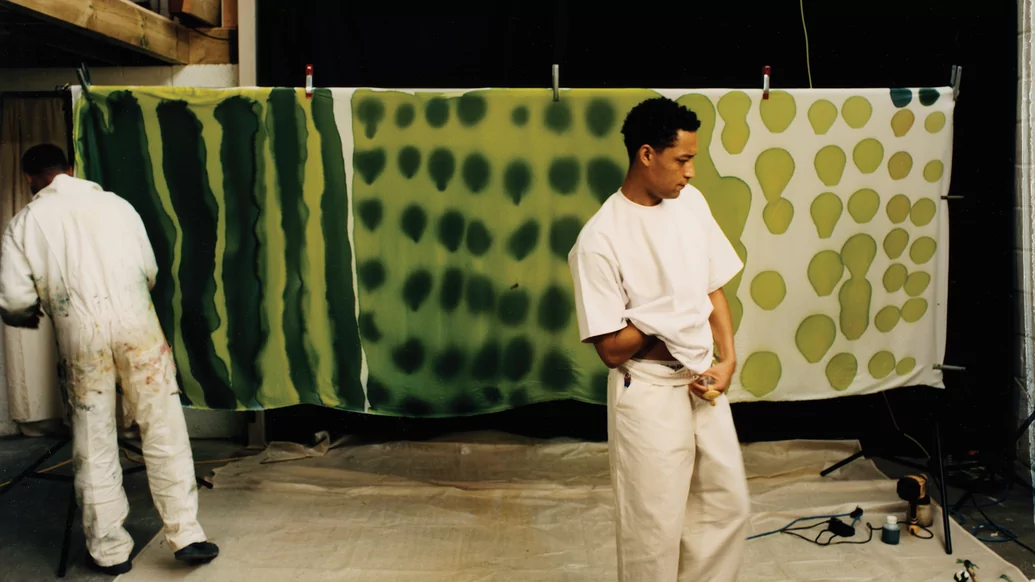
“I hope people can see the ‘nice’ me is in there on this album, but alongside the other side that maybe I haven’t shown. I always used to put my good days on paper, and kept my bad days secret. So here’s some of my bad days as well.”
At times, he’s felt pressured to force an edgier darkness into his work, before snapping himself out of that thinking. Those elements had to surface organically, as part of the journey of personal growth he’s been on. “I hope people can see the ‘nice’ me is in there on this album, but alongside the other side that maybe I haven’t shown. I always used to put my good days on paper, and kept my bad days secret. So here’s some of my bad days as well.”
‘hugo’ represents artistic freedom for Loyle. He spent its gestation listening to music that felt “of the moment”, from D’Angelo, Khruangbin and Rage Against The Machine, to Jimi Hendrix and the Red Hot Chili Peppers, wanting to capture the free spirit that pulsed through their records, then refine it. British producer kwes. helmed much of the production, with renowned jazz musicians like Alfa Mist, Richard Spaven and Rocco Palladino recruited to push Loyle out of his comfort zone during recording. “It just allowed me to be more free with my ideas,” he explains. “If we liked something, we built on it. If we didn’t, we moved on. It became a lot less daunting for me to just spill ideas out in the room. It was very freeing for me.”
First single and album curtain-raiser ‘Hate’ captures this freedom, and Loyle’s commitment to presenting a more complete vision of himself across the album’s 10 tracks. Beginning with a warped vocal sample and drums that hesitate before thundering into life, he raps with a chest-puffing directness that we haven’t heard before, about the societal injustices and two-dimensional tropes around Blackness that he hates, the “disgraceful” zeroes in his bank account that he loves, and fundamental to the project’s narrative, his deepest fears. “Wisdom, I fear him / Yeah, I fear the colour of my skin / I fear the colour of my kin,” he admits frankly, the directness in his voice wavering slightly, before bursting forth again with an affirmation of love for “the colour that’s within”.
The lyrics reference his biological dad, a Black British-Guyanese man who left the family home when he was a child. Loyle grew up in Croydon with his mum, stepbrother and stepdad, and spent plenty of time with his maternal grandparents. He was raised in an all-white household, estranged from his biological dad and his Black heritage. The frustration he felt at this separation is palpable on early cuts like 2015’s ‘Mufasa’ and ‘Tierney Terrace’, where the grief of his stepdad’s passing seems to confound a sense of abandonment and isolation. But on ‘hugo’, he reckons with the previously unacknowledged fear of what he felt he didn’t truly know, and how that shaped his experience as a mixed-race Black man.
“On both sides, I never really had any space to have this convo, for fear of being shut down, or cut out, or not being heard. So I never really spoke on this shit too much. I just tried to get in where I fit in,'' he explains. “All of these conversations were bubbling up inside of me. I was thinking a lot about my childhood, and how I never really got the chance to look at someone like myself and feel the complexities. It always frustrated me. I am racialized as Black, and that’s definitely how I see myself in the world. But I didn’t feel I had that community.” He pauses. “It’s complex.”
Loyle confronts those complexities on second track ‘Nobody Knows’, where his soul-baring unfolds over a soaring choral sample, like a pastor’s sermon. “At first, that song wasn’t even made for anyone else’s ears, other than me and my dad, so I could exorcise those demons and say ‘Listen, dad. I reached out to you, the Black man, and you didn’t take my hand. I then spoke to my white stepdad, before he passed away, and he didn’t understand. So where do I go?’ That’s what I’m talking about, things that happened in my house.”
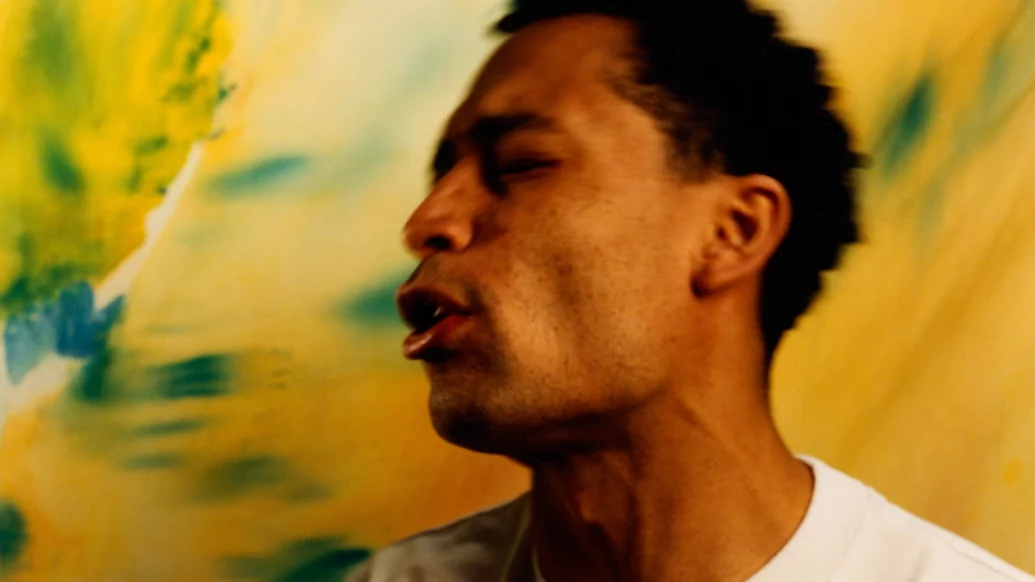
“And by the end of the album, I’m in a place where I understand him. It’s not only that I’ve forgiven my dad, but I understand [him] now. You hate what you fear, but you fear what you don’t understand.”
The enforced stillness of lockdown, during which his feelings had the time and space to develop, coupled with the news that his girlfriend was pregnant and he’d be a dad by the end of 2020, added a sense of clarity to Loyle’s thoughts around his identity. He resolved to reconnect with his dad, both for himself and for the sake of his unborn son. External factors and voices would only complicate things and the two men needed a place where they could express themselves freely. “So, he taught me to drive over lockdown, in his car. And his car is called Hugo, which is where the album’s name comes from,” he says, with a sudden shyness. “And it’s thanks to that car, to the space it gave us, that we’re closer now and that the album was made. It gave us a safe, private space to communicate.”
He continues: “You know, those first couple of lessons, it was peak! We’re in the car, and I’m saying ‘Yo, I hate you! You really let me down’. And then about halfway through he started telling me about things that happened to him, and what my grandad was like. By the end of those lessons, and by the end of the album, I’m in a place where I understand him. It’s not only that I’ve forgiven my dad, but I understand now. You hate what you fear, but you fear what you don’t understand.”
With that understanding, came a great sense of relief; Loyle was able to speak his truth and be understood too. The confidence with which he raps about being a mixed-race Black man on ‘Georgetown’ feels like a direct result of this process. The track is framed by legendary Afro-Guyanese poet John Agard reciting his poem Half-caste, and its video was shot in and around the South American nation’s capital. While there, treading the footsteps of his ancestors, he felt peace and genuine stillness. “It was the first time in my life that I’d felt that,” he says. The timeless feel of the production on ‘Georgetown’ is instantly recognisable as a Madlib creation. It’s the second time that Loyle has worked with the Beat Konducta, after 2020’s ‘Yesterday’, and reiterates his rap bona fides: wack emcees don’t get to rap on Madlib’s beats.
Tentatively reconnecting with his dad — who he describes as a man who wants to make their relationship work, but is “used to letting me down” — empowered Loyle to break down the ideas of Blackness he’d constructed in his head. “Growing up in a house where everyone was white meant my ideas of what my dad could or should be like, and what he could teach me, were very stereotypical.” School friends contributed their own prejudices to the misguided portrait he was painting of his dad too, adding to the confusion. “What was so cool when I finally connected with him, was he was able to go ‘Yes, I’m a Black man and these are all of the things that society expects of me, but I’m none of these things. I’m just a man’. So it was big for me to spend time with him.”
Moving album closer ‘HGU’ affirms his belief in their new bond, his forgiveness, and an acknowledgment that he’s a better, fuller person when he’s with his dad. ‘hugo’ then finishes with a recorded exchange from the end of their final driving lesson, before Loyle goes off to take his test — “which I passed, no minors,” he boasts, smiling. It’s a moment of awkward tenderness, both men clearly aware something that’s been profoundly restorative is ending, but quietly hopeful that something new is blossoming. “I thought it kind of summed everything up because I didn't want the album to feel like ‘I forgive my pops, and now we're best friends and everything's perfect!’ Instead, it’s about how I got to this point of openness. And whatever happens next, that's kind of in my dad's hands.”
The energy that propelled Loyle’s reconciliation with his dad was the birth of his son. He describes the experience of being a young father as a “journey of self-betterment” and something that immediately cuts down your ego. “I just feel eternally grateful. Obviously, he doesn’t understand yet, but he’s had such an impact on me,” he says. “It’s really a deep love, man. It's a deep improvement on your life.”
His initial description of fatherhood sounds like an idealistic deception, but the duality he’s embracing in his music extends to his life too. He’s no longer hiding the bad days. “It’s fucking hard too,” he concedes. “You know, it’s not easy to be here. There are days when you just wanna sleep, or you just need 20 minutes to yourself. And there will be ruptures too. Everybody will make mistakes, so the ruptures are expected. But it’s how you repair them — that’s the bit that I focus on with my son. Because we’re all gonna get angry, or frustrated and shout and slam doors. It’s about what you do afterwards, to give them the understanding that they're gonna have bad days and make mistakes, and they have to own up to them.”
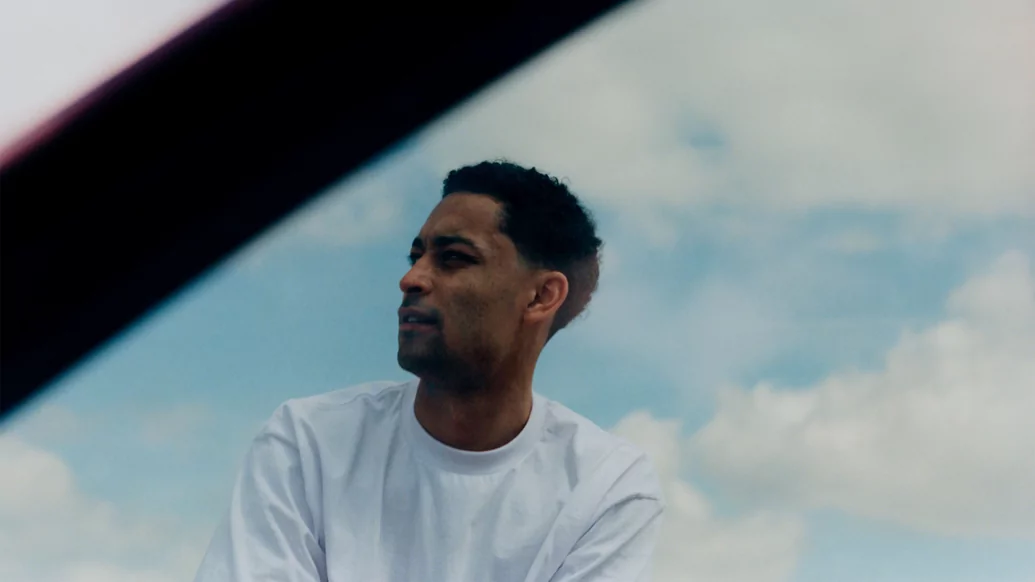
“To be a father is to be there all the time, this place of refuge for your child whenever they need it. Sometimes they won’t need it, and that’s fine. But when they do, you’ll be there.”
Dismantling the idea that he doesn’t have a darker side is a key theme of ‘hugo’. “I think there’s a misconception that I’m just this lovely, perfect guy. And man is lovely, don’t get me wrong,” he jokes, “but I’m also a bad person at times, like everybody else. And I wanted the world to see it, so that young men and women can look at me and go ‘Thank goodness that he's human as well’.”
Poignant, piano-led, late-album tracks ‘A Lasting Place’ and ‘Polyfilla’ find Loyle confronting his imperfections as a father and breaking cycles of hurt, and present the truest reflection of his artistic and personal growth. ‘Not Waving, But Drowning’ was critiqued for putting painful moments on wax and then seemingly going nowhere with them. This time round it's clear that he’s done the work to process that pain, and his music is richer for it. “I think I saw my dad as a flawed man, and I saw myself as perfect,” he admits. “And then I became a father and saw myself as a flawed man, too. I was able to look at myself and realise I’m really not that much better than this guy, and history repeats, because it’s human nature. So it’s about how you work through that, and respond to those mistakes. I’m not really focusing on perfection, but just showing up.”
‘A Lasting Place’ features words from a Kate Baer poem called What Kind of Man, recited by Loyle’s girlfriend. “It really captured what I was trying to get at — that to be a father is to be there all the time, this place of refuge for your child whenever they need it,” he explains. “Sometimes they won’t need it, and that’s fine. But when they do, you’ll be there.”
An existential weight permeates the album, be it through lyrics about fearing “the grim reaper”, a disdain for time and not wanting to be an old man, or the use of layered, live instrumental arrangements that give the songs a living, breathing quality. Parenthood can bring worries about life, death and purpose to the surface, and it feels like Loyle is grappling with them on ‘hugo’. “It’s weird though,” he says, “because I’m almost less scared of it now I’m a dad, knowing I get to leave behind this legacy that’s deeper than the bullshit things we put into the world. I’m not as scared, because I know this is how it has to be. I can’t change it. But what I can change is right now, the bit in the middle, where me and my son cross paths. I can try and make that as long and fruitful as possible.”

